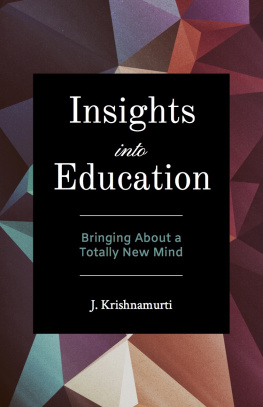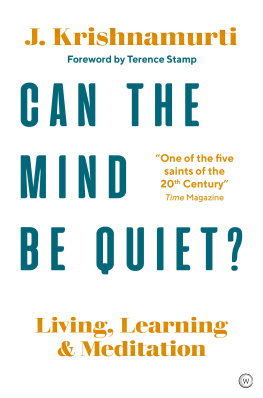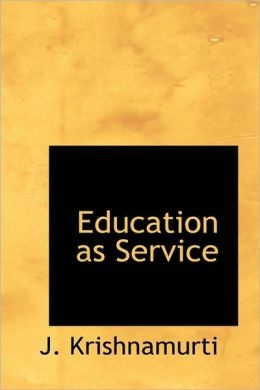Krishnamurti - Insights into Education: Bringing About a Totally New Mind
Here you can read online Krishnamurti - Insights into Education: Bringing About a Totally New Mind full text of the book (entire story) in english for free. Download pdf and epub, get meaning, cover and reviews about this ebook. genre: Religion. Description of the work, (preface) as well as reviews are available. Best literature library LitArk.com created for fans of good reading and offers a wide selection of genres:
Romance novel
Science fiction
Adventure
Detective
Science
History
Home and family
Prose
Art
Politics
Computer
Non-fiction
Religion
Business
Children
Humor
Choose a favorite category and find really read worthwhile books. Enjoy immersion in the world of imagination, feel the emotions of the characters or learn something new for yourself, make an fascinating discovery.
- Book:Insights into Education: Bringing About a Totally New Mind
- Author:
- Genre:
- Rating:4 / 5
- Favourites:Add to favourites
- Your mark:
- 80
- 1
- 2
- 3
- 4
- 5
Insights into Education: Bringing About a Totally New Mind: summary, description and annotation
We offer to read an annotation, description, summary or preface (depends on what the author of the book "Insights into Education: Bringing About a Totally New Mind" wrote himself). If you haven't found the necessary information about the book — write in the comments, we will try to find it.
Insights into Education: Bringing About a Totally New Mind — read online for free the complete book (whole text) full work
Below is the text of the book, divided by pages. System saving the place of the last page read, allows you to conveniently read the book "Insights into Education: Bringing About a Totally New Mind" online for free, without having to search again every time where you left off. Put a bookmark, and you can go to the page where you finished reading at any time.
Font size:
Interval:
Bookmark:
INSIGHTS INTO EDUCATION
Bringing about a totally new mind
J. Krishnamurti
Krishnamurti Foundation of America
Ojai, California
For additional information write to:
Krishnamurti Foundation of America
PO Box 1560
Ojai, CA 93024, United States
or
Krishnamurti Foundation Trust
Brockwood Park, Bramdean, Hampshire SO24 0LQ
United Kingdom
Copyright 2016 Krishnamurti Foundation Trust Ltd and Krishnamurti Foundation of America. All rights reserved. No part of this book may be used or reproduced in any manner whatsoever without written permission except in the case of brief quotations embodied in critical articles and reviews.
FIRST EDITION
Published by Krishnamurti Foundation of America
Editor: Stephen Smith
Associate editor: Alok Mathur
ISBN: 1539500446
Krishnamurti Foundation of America
www.kfa.org
www.jkrishnamurti.org
ISBN 13: 9781539500445
Also by J. Krishnamurti
Life Ahead
Education and the Significance of Life
On Education
Think on These Things
Talks with American Students
Is it not the function of education to help man to bring about a total revolution? Most of us are concerned with partial revolution, economic or social. But the revolution of which I am talking is a total revolution of man at all the levels of his consciousness, of his life, of his being. That requires a great deal of understanding. It is not the result of any theory or any system of thought; on the contrary, no system of thought can produce a revolution: it can only produce a particular effect which is not a revolution. The revolution which is essential at the present time can only come into being when there is a total apprehension of the process in which mans mind worksnot according to any particular religion or any particular philosophy or any systemthe understanding of ourselves as a total process. That is the only revolution that can bring about lasting peace. J. KrishnamurtiCONTENTS
FOREWORD
Insights into Education presents the educational philosophy of J. Krishnamurti in an easy to use, topic-based format. It is a practical handbook, not a book for private study; indeed, as experience has shown, it comes alive best when used as an introduction to group investigation and dialogue. What it offers to teachers everywhere is an inroad into the many matters of concern with which they are faced on a daily basis. That we cannot continue as we have been doing, with rote-learning, fact-finding, and a modicum of analysis as the building blocks of education, is obvious to anyone who is at all awareaware, that is, not only of the outer world with its amazing and accelerating technological advancement, but of the alienation, poverty, and despair, the gutters and suicides of our times. It is these very issues that are tackled here, sometimes implicitly but always at depth.
What Krishnamurti proposes, and here discloses, is a different approach to learning altogether, one that distinguishes itself radically from what we normally understand by that term: the accumulation of knowledge, with its application and testing. For, by thus narrowing down our understanding to the pragmatic and the measurablea tendency, moreover, that is on the increasewe forfeit the opportunity to probe deeply and to awaken intelligence in our students and in ourselves. What is meant by intelligence in this context is not the capacity to memorize and measure, but that subtler ability to see the whole which comes alive in a human being when he/she sees the limits of the measurable. To awaken this intelligence is the goal of education.
Intelligence is the capacity to perceive the essential, the what is; and to awaken this capacity, in oneself and in others, is education.J. KrishnamurtiOf course, the intelligence of which he speaks, which is really a shift in the dimension of learning, cannot be come upon solely by discussion. It requires the kind of orientation towards learning which sites it equally in the inner and the outer: as I learn about the world I am learning about myself. For, in terms of consciousness, the two are one.
But while challenging the basis and the thrust of education there are topics here that any teacher will recognize: Freedom, Freedom and Order in School, Fear and Authority in School, etc. Nor are these presented as the final word; on the contrary, each topic is intended for investigation, to be exposed and explored in actual situations. What is proposed is in no way dogmatic or canonical but rather that, in the spirit of inquiry, we open up the storehouse of the teachings so that their dynamic resonance can be felt and applied. In the context, for instance, of a dimensional shift it would be interesting to see in practical terms how this can be worked out in contemporary classrooms, including the approach to specific subjects. There is no prescribed method as such; what there is are clear, overarching statements and a host of indicators as to how to proceed. Try Listening, Looking, Learning for starters.
Some of the topics were originally intended for the use of teachers talking with each other as part of a reflective metadialogue, and these are of a more philosophical nature. But in reviewing the material for publication now, the editor feels that there is little time, existentially or practically, for these once well-established, nice distinctions. The situation is too urgent; as Krishnamurti puts it, The house is burning. We may even be doing the students a favour by opening up for them, easily and early, such abiding topics as fear, loneliness and death. For, surely, they are already aware of them and may even bring fresh insights to them. To many of us it is increasingly obvious that we are all in the same boat and that differences of age, sex, colour and class play very little part in the furtherance of true learning.
Stephen Smith: Ojai, California, May 2015THE PURPOSE OF LIFE
D oes life have a meaning, a purpose? Is not living in itself its own purpose, its own meaning? Why do we want more? Because we are so dissatisfied with our life; our life is so empty, so tawdry, so monotonous, doing the same thing over and over again, we want something more, something beyond that which we are doing. Since our everyday life is so empty, so dull, so meaningless, so boring, so intolerably stupid, we say life must have a fuller meaning...
A man who is living richly, a man who sees things as they are and is content with what he has, is not confused, he is clear; therefore he does not ask what is the purpose of life. For him, the very living is the beginning and the end. Our difficulty is that, since our life is empty, we want to find a purpose to life and strive for it. Such a purpose can only be mere intellection, without any reality; when the purpose of life is pursued by a stupid, dull mind, by an empty heart, that purpose will also be empty. Therefore our purpose is how to make our life rich, not with money and all the rest of it, but inwardly rich, which is not something cryptic. When you say that the purpose of life is to be happy, the purpose of life is to find God, that desire to find God is an escape from life and your God is merely a thing that is known. You can only make your way towards an object which you know; if you build a staircase to the thing that you call God, surely that is not God.
Reality can be understood only in living, not in escape. When you seek a purpose of life you are really escaping and not understanding what life is. Life is relationship, life is action in relationship; when I do not understand relationship, or when relationship is confused, then I seek a fuller meaning. Why are our lives so empty? Why are we so lonely, frustrated? Because we have never looked into ourselves and understood ourselves. We never admit to ourselves that this life is all we know and that it should therefore be understood fully and completely. We prefer to run away from ourselves, and that is why we seek the purpose of life away from relationship.
Next pageFont size:
Interval:
Bookmark:
Similar books «Insights into Education: Bringing About a Totally New Mind»
Look at similar books to Insights into Education: Bringing About a Totally New Mind. We have selected literature similar in name and meaning in the hope of providing readers with more options to find new, interesting, not yet read works.
Discussion, reviews of the book Insights into Education: Bringing About a Totally New Mind and just readers' own opinions. Leave your comments, write what you think about the work, its meaning or the main characters. Specify what exactly you liked and what you didn't like, and why you think so.










